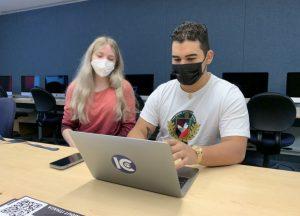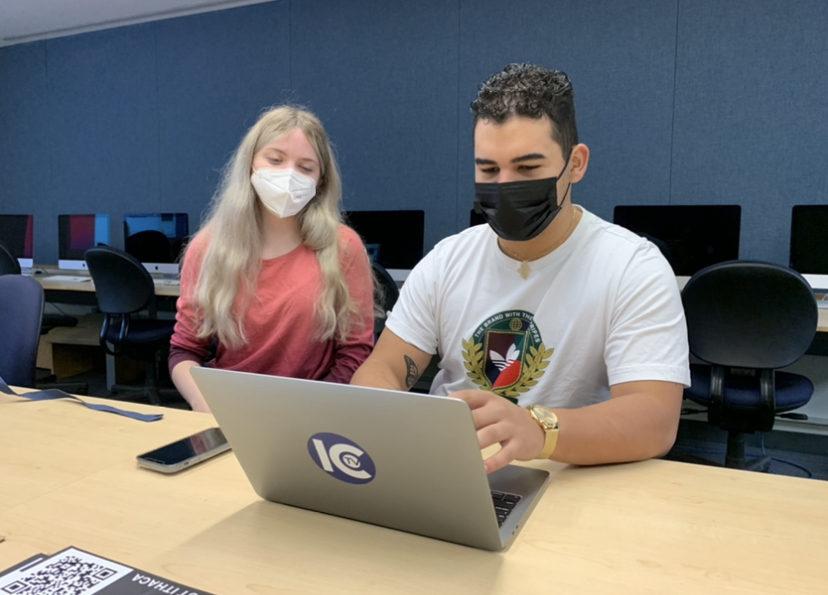
Masks have become a reality for us as we navigate the COVID-19 pandemic. The research behind masks and their effectiveness has shown that they are one of the many ways that we can protect ourselves and others from contracting the virus. But for those with different hearing levels, while the mask does so much to help protect them, it creates an obstacle to communicating.
Experiences at Ithaca College
Tyler Ruck, a junior at Ithaca College, uses hearing aids. Ruck was able to have nearly two semesters of in-person learning at IC before the school was forced to push all classes to an online format.
“Prior to the pandemic [in-person learning] it was overall fine, depending where I sat, the background noises, you know stuff like that but I typically had no issues,” Ruck said.
Being back to in-person learning at Ithaca College this fall has meant the implementation of mask-wearing requirements for indoor spaces all over campus, including in the classrooms. With the reimplementation of masks at IC and in schools across the nation, Ruck and other students with varying hearing levels have experienced troubles with understanding professors as well as their peers.
Effective immediately, face coverings are mandatory in all indoor campus spaces for all individuals, regardless of vaccination status.
You can read more about the policy here: https://t.co/QAv0gUwbQ8 pic.twitter.com/9LG3pF4c4D
— Ithaca College (@IthacaCollege) July 30, 2021
Masks’ Effect on Our Ability to Communicate Effectively
Regardless of one’s hearing level, masks present a host of challenges and barriers to effective communication. They muffle or distort speech, which can become worse in noisy environments with a lot of background noise.
They also hide facial cues that can be incredibly helpful not only for hearing persons but also for those with different hearing levels. The lack of social cues, primarily coming from the lips and facial expressions, due to mask-wearing can lead to miscommunication and misinterpretation.
Title II of the Americans with Disabilities Act includes a subsection that requires that students of different hearing levels are ensured “effective communication”. With many students and teachers wearing masks, the question becomes… are these students able to have an accessible learning experience?
Michele Westfall, a lecturer and clinical supervisor at Ithaca College as well as a speech therapist, explained how masks without clear inserts can prevent people with different hearing levels from practicing lip reading, which is what she calls an “accessibility tool” rather than a skill.
“It’s more of an art than a science, every person is different and you know things like having a mustache or having an accent or having a buck teeth or something like that can affect someone’s ability to lipread,” Westfall said. “…But I think having clear masks would allow someone to use that as an accessibility tool to read lips, maybe if they miss something go back and see this is how their mouth was shaped. So if I couldn’t decide if it was this word or this word, now I have that clue that tells me ‘oh it was this word.'”
An Accessible and Achievable Answer?
Westfall teaches classes at IC that focus on the Deaf community pushing her to make sure that her classrooms are accessible for students regardless of their accommodations or if they do have a different hearing level. “I think it would be very hypocritical [of] me to not have an accessible classroom”.
In her work as a speech therapist, she learned the importance and helpfulness of the clear masks when helping the children she works with.
“I encouraged my agency that I work for as a therapist to order clear masks because we work with small children and children who have different hearing levels, families that have different hearing levels, families that are not native English speakers and having any of those cues for language is helpful,” Westfall said.
This type of mask provides clear sight of the speaker’s lips and facial expressions, which are especially important for those with varying hearing levels, the ability to communicate better and more effectively with one another.
When asked, Westfall expressed wholehearted support for the college to provide professors with clear masks to make the classroom more accessible.
“I think it would help way more students than just students with different hearing levels. [It would help] students with auditory processing disorders [and] students with attention disorders. Having those extra cues and getting information through different modalities is always beneficial”.
Within her own department, Westfall has provided links to reusable and disposable clear masks for faculty in the Speech Pathology department to purchase and wear in their classrooms if they choose to do so.
How Have Educational Institutions Responded to Push for Clear Masks?
Clear masks have already been implemented in some educational settings across the nation. Rochester Institute of Technology (RIT) not only is housed in a city with a large Deaf population but also has about 1,100 deaf and hard-of-hearing students in attendance. With this in mind, RIT provided students with both a clear mask as well as a regular cloth mask.
For Tyler Ruck, he agreed that the college should give all members of the campus community, not just professors clear masks, “I mean they don’t really provide us masks at all anyway so yes and just honestly give them to everyone, it would just be beneficial.”













